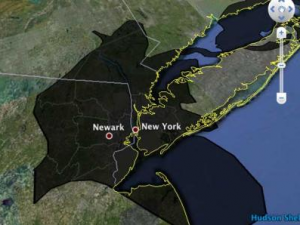The oil spill resulting from the April 20 explosion on the Deepwater Horizon now covers at least 2500 square miles of water surface. To help visualize the size of the spill, Paul Rademacher created Google Map mashups that show the spill placed over various cities. This image shows the spill if New York were the epicenter. As you can see, it is enormous, covering landmass in four states. As it is on the Gulf Coast, tar balls from the spill are washing up on local beaches with damage evident in Alabama, Louisiana and Mississippi. BP has offered US-based fishermen (the spill has not yet reached international waters) a one-month pay settlement package as compensation. All of the owners of Louisiana small fishing businesses with whom I have spoken have declined the offer, as their ultimate income loss will likely extend over a much longer period. It is important to remember that it is not just the commercial fishing businesses that will be affected. Many downstream businesses, such as seafood retailers and processing plants, face serious financial losses.
Yesterday the fishing waters in the Gulf were closed. With an annual harvest of more than one billion pounds of fish and shellfish, that equates to a lost harvest of 273,000 pounds each day. In response to this economic loss, the Small Business Administration is offering Economic Injury Disaster loans for small businesses in 13 Louisiana parishes and two Mississippi counties. The loans will offer working capital for up to $2 million at a 4% interest rate for a term of up to 30 years. Existing SBA borrowers who have been affected by the oil spill may request a deferment of their loans.
I explain the issues around the SBA’s Economic Injury Disaster Loans in Prepare for the Worst, Plan for the Best: Disaster Preparedness and Recovery for Small Businesses (Wiley, second edition 2009). I am particularly concerned in this case that insurance recoveries for the Gulf Coast fishing businesses may be inadequate to retire the proceeds of the SBA loans. Indeed, when I was just in Louisiana two weeks ago, I learned that insurance for small fishing businesses continues to remain unaffordable in the post-Katrina era. We do have a federal government fund established to finance the cleanup of oil spills. As it is funded by an eight-cent tax levied on each barrel of oil, it is insufficient for an environmental catastrophe such as this one. We need a comprehensive approach to disaster finance in the U.S. and one that is self-sustaining.
